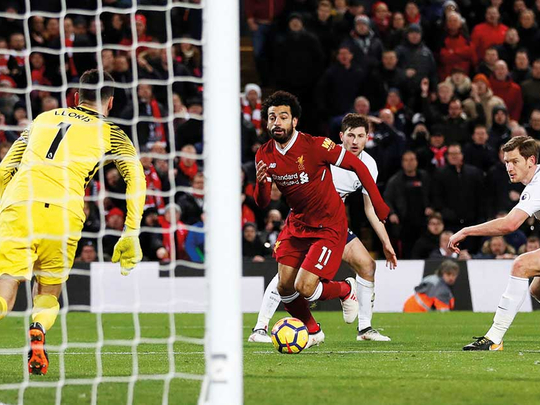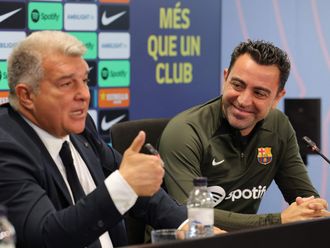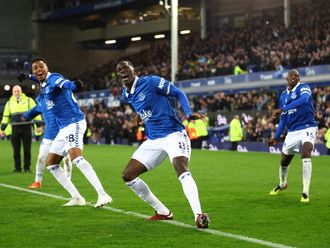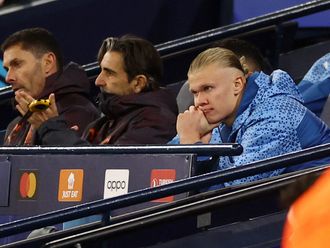
Liverpool: Lionel Messi is invoked only in extreme circumstances. Comparisons are usually odious. But there was no denying Mohammad Salah’s right to place his second goal against Tottenham Hotspur alongside the brilliance in tight spaces of Barcelona’s master of escapology.
The goal Salah scored in added time of a game decided by impromptu refereeing reviews would have sent Liverpool’s fans home feeling they had seen a thing of beauty. The joy, though, did not last. Moments after Salah had moved to 21 Premier League goals for the season — an extraordinary return for a so-called winger — Kane secured his 100th in England’s top division with a penalty that was not, but then was, after Edward Smart, the assistant referee, had imparted his own wisdom to Jon Moss, the chief arbiter. Salah’s brief taste of glory deserved a bit longer in the limelight.
Collecting the ball on the right side of the Tottenham penalty box, Salah started using his feet as pinball flippers as he jinked through and round four defenders, who were so bamboozled they started shifting in the wrong directions as Salah surged through.
Conventional logic was telling them to expect particular movements from Liverpool’s top scorer. In such moments, however, the best players are improvising madly, and there was something of Messi’s unpredictability in the way Salah slithered through to squeeze a shot past Hugo Lloris from a tight angle.
Lloris appeared no more confident than his defence of working out what Salah’s feet were doing. When the ball flashed into the net, Salah had the match in his pocket. Liverpool led 2-1 with minutes, seconds, of added time remaining. Game over, surely. And the stakes were high. The race for fourth, so often a contrivance, this year brings genuine excitement. Spurs and Liverpool, highly entertaining sides, are in a fight to see which is the most progressive — the most authentic — and have been joined by Chelsea in the tussle behind Manchester’s two big outfits.
Salah scored at the start and the end of a game full of thrills and talking points (shouting points, really). Three minutes in, he floated on to an errant back-pass by Eric Dier with only Lloris to beat. Sounds easy, but the execution was sweeping and precise, as Jurgen Klopp, his manager pointed out. “The first one was so cool, to get the ball there [in the corner], with or without the goalkeeper,” Klopp said. “And the second one was so difficult to defend, because everyone in the stadium — and his teammates — was expecting the pass. In the end he did it by himself.
“It was a fantastic goal, an outstanding performance. He was a danger and a threat throughout.”
The value of this threat can hardly be overstated. In this Liverpool side, Salah is the one who makes defenders twitch and sweat. Notionally a left-footed outside right, he has mastered the art of making runs across the forward line. They are rarely straight-line. He plants doubt in the minds of defenders by swaying and veering as he sprints, so they can never decide where he might be heading. The old term “back-pedalling” comes into play. Defenders run backwards in a crouch position, with eyes trained. When Salah is attacking, it is never just a foot race. To add a quick, elusive runner to Liverpool’s forward play was worth the transfer fee in itself, but Salah is behind only Harry Kane (22) in the league scoring charts. It took a linesman to alert the referee to Virgil van Dijk’s kick on Erik Lamela in the dying seconds for Kane to remain in front. Salah is the fastest Liverpool player to have reached 20 goals in the competition; quicker than Luis Suarez, Fernando Torres et al.
This, after failing to establish himself at Chelsea and moving to Rome, where he scored 29 times in 65 outings before coming to Merseyside, where he is a cult figure. The question is whether he will be an adornment to a top-four side unable to quite match Manchester City and United or the catalyst for a Liverpool renaissance, 28 years after they last won the league.
They remain an up-and-down kind of team. After beating the top side (City) 4-3 in another Anfield barnburner, they motored to the then bottom club (Swansea City) and lost 1-0 before heading out of the FA Cup to West Brom.
Nerves were settled with a 3-0 win at Huddersfield before this alluring clash with a side who dominated Manchester United at Wembley last Wednesday.
Liverpool can torment opponents with what Klopp called here “fantastic high pressure” — and their movement can be dazzling. But no team can sustain this for 90 minutes — especially against sides of Spurs’ quality — so the question becomes: how do they cope, how calmly do they defend a lead, when the other side force their way back?
Here, you could say Victor Wanyama’s equalising blast was not closed down, while Van Dijk was heedless in swinging his boot at Lamela. Equally, bookmakers still make Liverpool 1-4 to finish in the top four, with Spurs 4-6 — a remarkable disparity. For a day or so, Liverpool can just bask in the glow of Salah’s second goal: borrowed from Messi, and proof of a blossoming talent.












